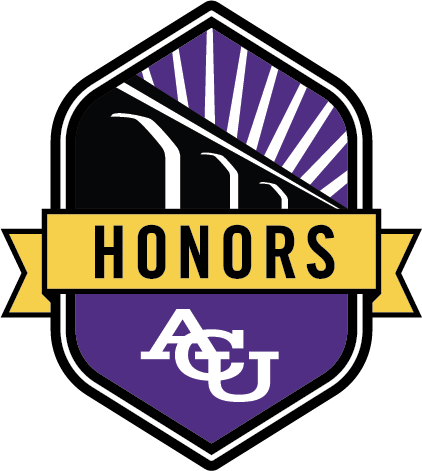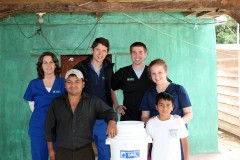 Never again will I feel the same way when I reach for a bottle of water, after seeing people drink water that I would not want to use to do my laundry this past March. My spring break campaign to Guatemala was an experience unlike anything I have ever had. I have been on mission trips in the past, but something about combining my passion for medicine and my love for the Hispanic people made this a week I will never forget. The group from ACU spent about a week in Chichicastenango, traveling to towns around the larger city every day to set up a medical/dental clinic and to deliver water filters to area families. In this way, we ministered to as many needs in the community as possible. Though it was both emotionally and physically exhausting for me and for those with whom I went, it was certainly the most rewarding experience of my life so far.
Never again will I feel the same way when I reach for a bottle of water, after seeing people drink water that I would not want to use to do my laundry this past March. My spring break campaign to Guatemala was an experience unlike anything I have ever had. I have been on mission trips in the past, but something about combining my passion for medicine and my love for the Hispanic people made this a week I will never forget. The group from ACU spent about a week in Chichicastenango, traveling to towns around the larger city every day to set up a medical/dental clinic and to deliver water filters to area families. In this way, we ministered to as many needs in the community as possible. Though it was both emotionally and physically exhausting for me and for those with whom I went, it was certainly the most rewarding experience of my life so far.
Our trip opened with, what I called in my journal, ‘America in Spanish.’ After staying in Guatemala City for a night, I felt adequately prepared to conquer any problems that may be present in a third world country. I had eaten McDonalds for dinner and fresh fruit for breakfast, slept in a king size bed with a mattress nicer than that in my dorm, and showered, using as much hot water as I pleased. Then the real trip began. When we began loading the van, the Dunhams, a husband and wife very involved with Health Talents International there in Guatemala who guided our work while we were there, taught us the first saying imperative to know in Guatemala. “Where three fit, four fit.” I found out quickly the practical application of this when fourteen of us piled into a fourteen-passenger van… and then began realized our luggage would be in the same van. The three-hour drive was torturous. Twists and turns that ought to be outlawed characterized a rough, bumpy ride. Then, we were in Chichicastenango, and I saw the real Guatemala.
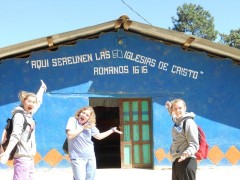 Though each day was characterized by its own unique set of challenges, we quickly learned to expect problems and handle them when they came. We worked Monday through Thursday. I was in a different town each day, ranging from Caris to Xepocol. Some were only ten minutes or so from our hotel, whereas one was two hours even farther up the mountain. We started bright and early each morning, dressed in our scrubs with HTI nametags in place.
Though each day was characterized by its own unique set of challenges, we quickly learned to expect problems and handle them when they came. We worked Monday through Thursday. I was in a different town each day, ranging from Caris to Xepocol. Some were only ten minutes or so from our hotel, whereas one was two hours even farther up the mountain. We started bright and early each morning, dressed in our scrubs with HTI nametags in place.
The first day, I helped to deliver water filters. These were specifically for families in the areas we visited involved in the ABC program. This program helps to support the poorest families, who frequently take their children out of school at a very young age in order for them to begin working and supporting their family. The ABC program works to provide the basic necessities for these families, in exchange for leaving their children in school, allowing them to get a better education and be better equipped to someday contribute to their community. Kemmel Dunham told us that even the teens given the opportunity to continue schooling through high school, allowing them to pursue jobs as teachers in the city, often return to the family home. This act is seen as one of loyalty to family and to roots, both of which are held in the highest of esteem there. Kemmel and three of us students set out with ten filter systems or so, prepared to clean and set one up at each house. I was amazed at how easily Kemmel found each home! We would leave on a dirt road, which wound into another dirt road, which dead ended into a field, which we crossed to another dirt road…and yet he always knew where we were going. Suddenly, there would be a low-walled structure or two, and two or three generations of a family would be there to greet us. To me, this spoke of many visits similar to this one. He cared enough for these people to visit them frequently. While his wife, a physician, cared for the bodies of the ill, Kemmel cared deeply for their hearts. The Guatemalans welcomed him into their homes as though he were one of them, questioning him regarding the health of his wife and children, and treating him like family. Though they were more with those of us new to the work, we were always welcomed with some foreign drink or food. I ate and drank some things of which I am unaware of their origins, but it would have been rude to decline. This was when I learned a valuable lesson of missionary work. Others come first. If you had asked me if I knew this before I went to Guatemala, I would have said yes. Kemmel showed me otherwise. His whole life is about service, whether it means walking a mile on a dirt road through the brush or drinking a drink with unsubstantiated chunks in it because it was offered.
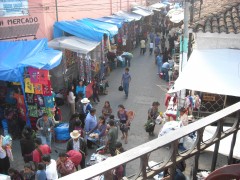 The next two days, I shadowed Dr. Jeff Webb, a dentist from Abilene who had been on this trip several times. Shadowing a dentist was a new experience for me, and I enjoyed it tremendously. Dr. Webb explained to me the different purposes of the bones in the jaw and allowed me to be as close as possible while he was working. I handed him instruments, of which he taught me the names and purposes.
The next two days, I shadowed Dr. Jeff Webb, a dentist from Abilene who had been on this trip several times. Shadowing a dentist was a new experience for me, and I enjoyed it tremendously. Dr. Webb explained to me the different purposes of the bones in the jaw and allowed me to be as close as possible while he was working. I handed him instruments, of which he taught me the names and purposes.
The first day, we did check-ups on about thirty ABC kids. It was sad to see how many children had teeth already rotting and causing tremendous amounts of pain. The poor hygiene prevalent in the poorer regions of Guatemala wreaks havoc on the children’s teeth and gums. Dr. Webb told me that many health problems in third world countries are caused by ignorance. The next day, I got an even clearer picture of this. The number of dental patients that day was astounding. They formed a line outside the clinic, many in pain, and we began to usher them into the small, low ceilinged, dark room a few at a time. Each of our two dentists would take a patient, administer anesthesia, and begin pulling teeth. I saw wisdom teeth pulled, and as many as four adult teeth pulled on a single patient. There was little we could do to relieve their pain other than pull the teeth and give them enough ibuprofen for a few days. It was so sad to see that, though they left with gaps in their mouths of which an American would be ashamed, they left smiling, for they were no longer in pain. I saw gratitude unlike any I have ever seen on the faces of people who had been granted relief from a condition that may have plagued them for years.
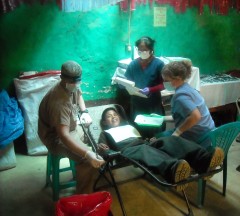 Another characteristic I saw frequently this week was bravery. People trekked over the mountains for hours to be able to see a physician. The children we saw came back to see the dentist alone, facing the new and the scary without a parental arm around them to soothe the fear. Courage in the face of adversity is a way of life for the Guatemalan people. My hurt hearts for these people who are constantly suffering, yet find reasons to smile and special strength to face each day. When I returned home at the end of the week, I was appalled to see how much I constantly take day-to-day luxuries for granted. The people of Guatemala opened my eyes to a part of the world I had not seen, but will never forget.
Another characteristic I saw frequently this week was bravery. People trekked over the mountains for hours to be able to see a physician. The children we saw came back to see the dentist alone, facing the new and the scary without a parental arm around them to soothe the fear. Courage in the face of adversity is a way of life for the Guatemalan people. My hurt hearts for these people who are constantly suffering, yet find reasons to smile and special strength to face each day. When I returned home at the end of the week, I was appalled to see how much I constantly take day-to-day luxuries for granted. The people of Guatemala opened my eyes to a part of the world I had not seen, but will never forget.
